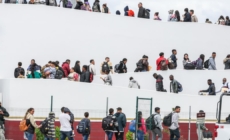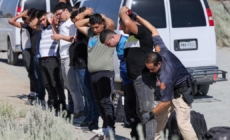-
Disappointment at border as Trump cancels immigration program - 15 mins ago
-
Why Kylie Jenner Is Being Slammed After Using $72M Jet - 33 mins ago
-
2025 NBA Power Rankings: Cavs, Thunder lead mid-season check-in - 37 mins ago
-
In Western Altadena, where 17 died, Eaton fire evacuation order was delayed - 53 mins ago
-
Mets Predicted to Replace Pete Alonso With 4-Time Gold Glove Award Winner - about 1 hour ago
-
No. 7 Texas Longhorns vs. No. 8 Maryland Terrapins Highlights | FOX College Women’s Hoops - about 1 hour ago
-
Trump pledges to restore McKinley’s name to tallest peak in North America - 2 hours ago
-
Kygo’s Palm Tree Beach Club to Redefine Las Vegas Daylife - 2 hours ago
-
Joel Klatt’s CFP title game prediction: Can Notre Dame make it a low-scoring affair? - 2 hours ago
-
Trump’s inauguration celebrated by Candace Cameron Bure, more Hollywood stars: ‘God Bless America’ - 2 hours ago
Mexico’s president opposes Trump immigration policies, vows to help those deported
OTAY MESA, Calif. — It was a quiet morning as Customs and Border Protection agents patrolled the primary and secondary fences that divide San Diego and Tijuana as the nation awaited newly sworn-in President Donald Trump to sign a series of immigration-related executive orders.
In his first speech as president, Trump said he “will declare a national emergency at our southern border. All illegal entry will immediately be halted, and we will begin the process of returning millions and millions of criminal aliens back to the places from which they came.”
Trump vowed to reinstate “Remain in Mexico,” a policy from his first administration requiring anyone seeking to enter the United States through Mexico to remain in that country.
He also promised to “send troops to the southern border to repel the disastrous invasion of our country.”
With agents still awaiting new guidance, it was not immediately clear how exactly the executive orders will affect operations on the ground.
But ahead of Trump’s inauguration, Mexican President Claudia Sheinbaum and members of her Cabinet expressed their disagreement with his plan to revive the “Remain in Mexico” policy and the “unilateral deportations” of Mexican nationals living in the U.S.
“If they reinstate it, this is something we don’t agree with. We have a different focus. We want to adjust it,” Juan Ramón de la Fuente, Mexico’s secretary for external relations, said in a news conference Monday morning. But ultimately, “the desire is to keep the same policies as now,” he added.
De la Fuente described the “Remain in Mexico” policy as an “unilateral” one, meaning that it “does not require the assistance of other countries” to put it in place.
While the policy does not obligate Mexico to process U.S. asylum requests, de la Fuente said, “we can come to some agreements and find a way to operate.”
Sheinbaum said she and her administration “insist that there is a possibility to get asylum, not only from the border in person, but from a distance in the southern part of the country or in other countries.”
“That’s what we’re working on,” she added.
Sheinbaum also insisted that the CBP One app, which allowed migrants seeking asylum to be prescreened before reaching the U.S., should be kept. According to her, “this will help alleviate the tension in the northern border of Mexico and the southern border of the U.S.”
However, the website for the CBP One app stated Monday afternoon that it “is no longer available, and existing appointments have been cancelled.”
With Trump vowing to begin enacting the largest mass deportation operation in U.S. history, Mexican Interior Secretary Rosa Icela Rodríguez Velázquez said that while the Mexican government does not agree with such actions, “we will receive them and give them access to Mexico’s welfare programs.”
These would include access to health services for them and their families, transport to their home countries and access to telephone communications, according to Rodríguez Velázquez, as well as any other services offered by Mexico’s Social Security Institute.
Trump, again, reiterated his intention to sign an executive order to rename the Gulf of Mexico to the Gulf of America during his inaugural speech.
While it’s not clear if a U.S. president has the authority to rename international waters, Sheinbaum had previously clapped back at Trump by suggesting that the U.S. should be renamed “America Mexicana.”
Nicole Acevedo reported from New York and Jacob Soboroff from Otay Mesa, California.
Source link






























